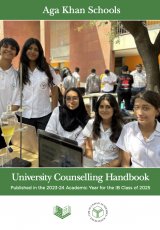Summer Camp 2011
Last summer, 65 students from the Hyderabad area spent two weeks at the Aga Khan Academy, Hyderabad for ten days full of fun, learning, and skills development.
Students arrive for their first day of summer camp at the Aga Khan Academy, Hyderabad. The summer camp, held in advance of the opening of the new Academy in Hyderabad, provided an opportunity for faculty and administrators to try out new approaches to teaching and classroom management. The camp curriculum also introduced students to the Academy's learning approach and worked on improving their English language skills prior to the official opening. The Academy officially opened its doors to students on 16 August 2011.Summer camp participants arrived at the new, purpose-built Academy every morning and proceeded to spend the day in learning groups. They participated in classroom activities designed to help them become used to the new teaching environment while working on their core English reading, writing, speaking, and listening skills. Throughout the day, campers engaged in various activities including music, art, sports, and storytelling in the classroom and outside on the new campus grounds.
Testing New Approaches
The faculty and staff at the Aga Khan Academy, Hyderabad worked with special teaching consultants to create a summer camp programme that allowed them to address needs in areas such as classroom management and inquiry-based language teaching. They also participated in two special teacher training workshops during the two-week summer camp session.
Students working on a learning activity. The skills, techniques, and approaches that were trialed during the two weeks of camp reflected the pedagogical approach of the Aga Khan Academies worldwide and gave teachers more comfort with the style and content of the curriculum.
Under the leadership of the Acting Junior School Principal, Diana Smith, the teaching staff at the summer camp continued to develop their strong team spirit in advance of the official opening of the Academy. The faculty and consultants worked together to create structures for the students that reinforced appropriate classroom behavior and that fostered inquiry and curiosity among the children. Behaviors such as turn-taking, focused listening, and using non-verbal signs to get attention from the teacher were modeled by the staff to the students, building an environment that was conducive to learning.
Tracking Student Progress
The new teaching approaches and learning environment had a positive impact on the summer camp participants. At the end of the two-week programme, the students showed significant improvement in their English reading and writing skills and a notable increase in confidence when speaking in English. Additionally, student behaviour improved considerably over the ten days at camp, and each camper showed heightened creativity in their responses and thinking around the curriculum material.
The students used various medial to express their learning. Student creative work was displayed throughout the summer camp in classrooms and around the Academy, recognising students for their progress and accomplishment. This also encouraged feedback, assistance, and recognition from their peers.Regular, measurable evaluation activities took place throughout the two weeks, giving teachers an opportunity to track student progress as well as the effectiveness of their techniques and approaches.
Overall, participants left the summer camp programme excited about the friends they had made, the experience they had gained, and the learning they had received. The summer camp provided an excellent opportunity for both staff and students to prepare for the official first day of classes at the new Academy in Hyderabad.
publications




